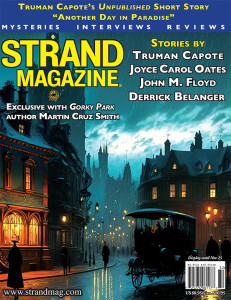 Truman Capote’s Another Day in Paradise is a recently rediscovered work by the well known literary figure. It leans more toward his society work than the material found within In Cold Blood. It deals with Iris Greentree, a bitter woman who lost love and ended up in Sicily with a fairly nice trust fund paying her expenses.
Truman Capote’s Another Day in Paradise is a recently rediscovered work by the well known literary figure. It leans more toward his society work than the material found within In Cold Blood. It deals with Iris Greentree, a bitter woman who lost love and ended up in Sicily with a fairly nice trust fund paying her expenses.
Ethnic hatred born out of a dislike of one’s situation is a noticeable part of the story. In the beginning we find Iris thinking of her employee Giovanna as “a thief, a liar, a sluggard” and more negative concepts. These do not exactly make a reader feel good about her, instead quickly drawing sympathy to the employee.
One of the biggest crime elements of the story is in an attempted theft of food from Miss Greentree. While this is done by the family of Giovanna and could be argued as a certain amount of proof of her problem with Sicilians, the tone and nature of the crime make it clear she not only lacks empathy but treats the idea an employee will do something like this as a perfunctory reality.
Capote engineers an element of sympathy for Greentree by intercutting the story with italicized excerpts from her letters and journals, which reveal the woman before she had been beaten by the world into the less than lovable figure she became. These moments of hopefulness and delight at beauty are carefully interspersed, often mid paragraph, which brilliantly allows readers to see how damaged she is, and how much she takes for granted.
Capote highlights the class issues involved by having her encounter a much richer woman whose poodle bites Iris; her envy for the richer woman and loathing for the poorer one are depicted as similar emotional states which both lend themselves to the woman’s unhappiness.
Elements of Capote’s talent are evident; while it’s not the most iconic piece by the author, it does bear many of the trademarks of Capote’s style. One can see why this story wasn’t published in his lifetime. It is uneven in places and its social message unfocused. At the same time there are the widely drawn characters and bits of satire the man was known for, as well as a decided stylistic inventiveness. Certainly its publication is fortunate. He could perhaps have turned it into a better story, but it is a solid story as is.
(Strand, 2023)
